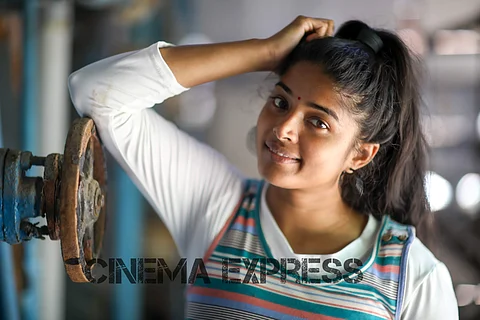

Last year, Sheela Rajkumar played the titular role in Mohan G's controversial directorial debut, Draupathi, that was censured for its regressive take on caste politics. A year later, she has now featured in the progressive political satire, Mandela, that mocks casteism. In this film, she plays the role of a postwoman, Thenmozhi, who catalyses the transformation of the film's protagonist, Smile aka Mandela (Yogi Babu). In this chat, she speaks of her film choices and her inspirations.
Excerpts from the interview:
To Let, Kumbalangi Nights, Draupathi, Mandela... You have featured in all these films that have been central topics of conversation.
I think of it as a miracle. I have always intended to be part of powerful cinema; I am glad it has finally turned out to be a reality. I consider the story to be the star of a film, and that's how I have chosen my projects. I ask myself, ‘What is in this film for Sheela?’ As long as I am in the industry, I want to be part of constructive cinema.
I have learned a lot from mistakes. It has taken many bad experiences and misplaced decisions to come here. I have said no to numerous films just to be part of To Let. I think of myself as clay. The process of my sculpture is ongoing.
Did hailing from a village (near Jayankondam) affect your exposure to the film industry? Tell us about your initial struggles.
Acting was a childhood fixation for me, but I never knew how to turn it into a career. After studying Bharatanatyam in Kalai Kaveri College of Fine Arts in Trichy, I began acting in the Nalaiya Iyakunar short films. I decided to move to Chennai to increase my prospects and joined Koothu Pattarai. There, I did a play called England for which I had given an interview to a popular Tamil magazine. Director Chezhiyan read that and contacted me for To Let…
How did you land Mandela?
It happened because of To Let. Madonne Ashwin pitched the film to me, and I told him I wanted to hear the whole story. He narrated it and it was an immediate 'yes' from me. They needed two days to consult the producer and I was ready for both outcomes by then. It turned out to be a positive one!
How did you relate to your character, Thenmozhi?
Phones were not the de facto mode of communication in my village during my childhood. A 'post-mama' served as our primary connection to my dad, who was living abroad. I remember waiting for his sporadic visits with letters. Also, I have spent significant years in hostels, and I would often spend an entire day every week writing a letter to parents. We would all sit together and write on those yellow postcards in which we would make requests for meen kuzhambu, adhirasam, stationery items... Working on this film brought back all those memories.
Any regrets that Mandela did not get a theatre release?
We were all disappointed for a while, but given the circumstances, I am just glad that the film reached the masses. To watch yourself on the big screen is the dream of every actor. However, with the TV premiere and Netflix release, Mandela reached people's homes. I heard many telling me that they had fun watching this film in their living room with the family.
While Mandela is lauded for its satirical stand against caste oppression, your last film, Draupathi, was criticised for standing against inter-caste marriage. Were you aware of this political stand while doing the film?
I didn't know. After To Let and Kumbalangi Nights, I was simply looking to do a bold role because I didn't want people to think that I could only do a certain kind of role. That's when Draupathi came my way. The name itself seemed intriguing to me. Mahabharatam happened because of the character. I did whatever the script and the director demanded from me for the role. Unlike in theatre, where everything is in the control of an actor, cinema is not the medium for individual expression. As an actor, I cannot always be right. Perhaps the people who criticise me for choosing one film, will end up applauding other films I do—like Mandela.